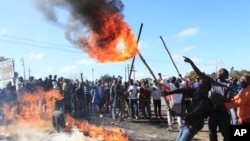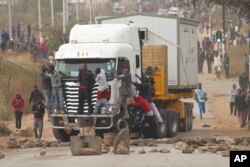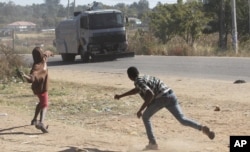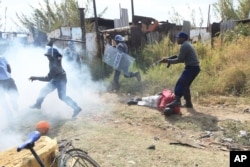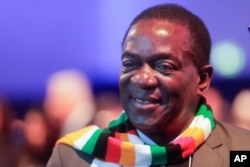The Zimbabwe Congress of Trade Unions (ZCTU) and several non-governmental organizations are planning a nationwide shutdown, saying local people are experiencing serious hardships due to the current harsh economic situation.
In a video posted on various social media platforms Sunday, Pastor Evan Mawarire of #ThisFlag Campaign and ZCTU president, Peter Mutasa, urged all Zimbabweans to join the strike.
Mawarire, who staged a similar protest with Tajamuka Sesijikile Campaign in 2016 which brought the country to a standstill, said people are fed up with what is happening in the country.
“… We have decided that we must stand together as citizens and workers and reject what is happening in our country. We cannot accept what is happening … Fuel price increases, the use of the hopeless bond note. People are struggling in life. We can’t just sit and watch. We are calling a stay away, a shutdown of the nation. No one is going to work. We have partnered with the ZCTU and other organizations.
“We must do this together. It’s not for one person. It’s for everyone. So, Monday, Tuesday and Wednesday we are staying away, we are shutting it (Zimbabwe) down.”
In the same video, Mutasa urged all Zimbabweans to join the protest saying local people are living from hand to mouth.
“Everyone is suffering. Look at children at boarding schools they are suffering, look at those at tertiary institutions, there are going to be drop outs. Their parents are failing to make ends meet. We are earning low salaries, an average of $300 (per month) and now with the price increases of fuel and basic commodities we are now working just for transport. We have decided as the ZCTU that this cannot go on.
“We have three key demands. The first one is that the government must quickly address the economic challenges that we are facing. The second one is that workers must be paid in U.S dollars. We must dollarize the economy. The bond note must be dumped, the RTGS (Real Time Gross Settlement) must be dumped.”
Pastor Mawarire used Facebook and other social media platforms in 2016 together with Tajamuka to shutdown the government. Scores of people were arrested during and after the protests.
Information Minister Monica Mutsvangwa was unavailable to comment.
In an indirect response to the planned protest, Energy Mutodi, deputy information minister said in a tweet Sunday evening, “Faced with high fuel costs, clever people know what to do & here are some tips: Avoid fuel guzzler, reduce fleet, cancel unnecessary trips & use bicycles where possible to save BIG. Do not protest in the street you can lose a limp (sic) in skirmishes.”
In another tweet, he said, “New fuel prices will stamp out arbitrage in the fuel sector & normalize fuel supply but Zimbabweans must brace for commodity price volatility emanating from the fuel price shock. Volatility will be temporary before goods normalize.”
He was not available to elaborate on these tweets.
Zimbabwe increased fuel prices by at least 150 percent on Saturday. President Emmerson Mnangagwa, who announced the price hikes, said, “With effect from midnight tonight, a fuel pump price of $3.11 per litre for diesel and $3.31 per litre for petrol will come into effect. These prices are predicated on the ruling official exchange rate of 1:1 between the bond note and the US dollar and also on the need to keep fuel retailers viable.”
Diesel cost $1.38 and petrol $1.43 a litre before Mnangagwa announced the new price increases.
Mnangagwa has left the country for a five-nation official visit to Russia, Belarus, Azerbaijan and Kazakhstan. He is also expected to travel to Switzerland where he will attend the World Economic Forum.




